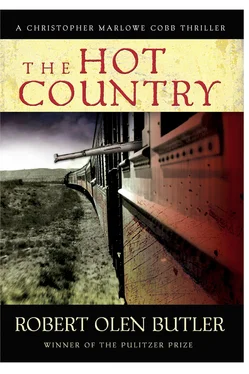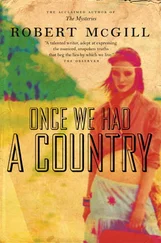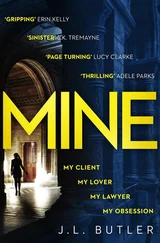And behind me I heard sounds: a rustle and then a foot-thump. She had jumped to the ground from the boxcar.
I turned.
Luisa was before me. Barely an arm’s length away. She unsheathed a small hunting knife with a four-inch blade.
Something in me went: To hell with it. Let her at least make the gesture to kill me.
And Luisa lifted the knife straight up, the blade vertical, and there was a very brief moment, at the apogee of the lifting, where I expected it now to come at me, a straight thrust forward toward my chest, and I was very conscious of the blade tip, so I recognized at once — at its tiniest first impulse — that it was not meant for me. She moved the blade not slowly, not slowly, but quickly and the blade fell to the horizontal and went flat and pointed inward and I knew it was her throat she wanted to cut and already my left hand was in motion — my baseball-glove hand, which was a good reflex, I was racing her knife hand from behind — and the knife started its plunge to her throat and she was quick but I was quick too and my hand was open wide and our hands flashed and I caught her at the wrist and I had her.
And the strength of her arm vanished at once. Her arm yielded to me and my other hand came up and touched hers and I was working my fingers into her palm and under the knife handle and I was pulling and she let it go. She let me take the knife from her. I dropped it at our feet, and I let go of her wrist and I stretched out my arms and put my hands behind her shoulders and I pulled her gently toward me, in small incremental tugs, and her hands fell to her sides. She did not lift her arms to go around me in return, but she did not struggle, she did not pull away, she let me enfold her, let me hold her close.
And after a time, yes. She put her arms around me. And I was smart enough to keep my mouth shut. I was smart enough not to try to explain what I realized about how I’d said the wrong things to her. And now with the knife at our feet, I understood even more. That her country was more important to her than her own life. It was why she wanted to come and fight. That her country needed Pancho Villa. And so if he raped her, the answer was not to kill him. It was to kill herself. And for an American of all people to offer to help her kill him? That kind of obliviousness was why she put a pistol to my head in the candlelight. I was surprised she had her arms around me now, though perhaps she realized that in my offering to help her kill the man who raped her, to kill Pancho Villa, I was offering up my own life alongside hers in the act of revenge. And I was inviting her to take up a weapon again. She would kill him. I would simply help. I understood that perhaps even worse for Luisa than Villa violating her was Villa taking away her rifle and forcing her back to a woman’s work. The man she so admired turned her back into a powerless washerwoman. All this I now knew. And I said none of it to her. Her arms were around me.
We were, in the embrace, entirely motionless for a long while. Then, as if we both knew the precise moment when it was time, we let go of each other. She looked at her left hand as if it were not hers. She was still holding the scabbard of the knife. She looked at me. I gently took the scabbard. I located the knife on the ground near us and I picked it up, sheathed it. Luisa and I both looked at the thing, and I supposed I should simply throw it as far as I could into the night. Certainly I should not give it back to her. But something made me slip the scabbard onto my belt. She watched me do this and then she turned and I stepped up beside her and we began to walk together.
We walked along the track, going forward, past the engine of Villa’s personal train, past the farthest fringes of the encamping Villistas . We walked toward the isolated mountain peaks to the east, visible only as a vast, dark absence against the starry sky. We walked side by side but we did not touch. I did not take her hand. I did not slip my arm around her. I was determined to make no more mistakes with Luisa Morales, and though I thought I understood certain things about her and about how I’d done badly by her, I realized there were many other things about which I was ignorant. Like exactly why she had forgiven me. This was something women could do about which I was utterly ignorant. Especially this woman, in this circumstance. And I was ignorant of how a woman felt in the aftermath of what had been done to her. How she might feel about the act my body wanted very badly now. I did understand this: The way I was inclined to do that act would likely be entirely wrong for her at the moment. But I was not sure I could change.
And at last the campfires seemed as distant as the stars. The moon was rising and our night shadows stretched long before us. And somehow we silently decided to move away from the railroad track. Not far. Fifty yards or so into the desert, we found an outcropping of large, humpbacked boulders but with a broad, table-flat stretch of rock at their base. Perfect for us. We sat. We were silent for a while.
Finally Luisa said, “Why did you come here?”
“I’m following a story.”
She did not ask. And I realized I should not say. Should not raise the politics of Mexico with her. But if this had to end badly again because of who I was, then it was better for it to just end now. I said, “A German has come here trying to persuade Mexico to invade the United States.”
She did not reply for a long while.
I watched my hands lying motionless on my knees. They were white as a dead man’s.
And then she said, “How were you hurt?”
She’d noticed my wound, though when she asked the question, she was looking back toward the camp. Or at the moon.
I said, “I ended up riding with some of the Villistas . A man I know is an officer. We had to fight a gang of colorados .”
She turned to me.
I realized I’d surprised her.
She said, “You fought?”
“Yes.”
“Did you kill some colorados? ”
She trapped me before with a question. I thought it was happening again. I didn’t know if she would feel better about me for killing the worst of the Federales . Or feel worse about me for killing Mexicans. But I answered her. “Yes.”
I’d made a mistake in sitting to her east. My face was lit by moonlight. Her face was in deep shadow. I knew she was looking intently at me, but I could not read her. Still, I kept my gaze steady on the darkest parts of her shadowed self, which were her eyes. This would have been easier if I’d not grown up in theaters. Aware of what she might be seeing in my face, I was inclined now to try to play myself. But I understood the paradox. The more I tried consciously to portray me, the less I actually was me. It was too late. I gave her my profile.
She said, “Why did you find me?”
I didn’t answer for a moment. I didn’t even fully know what the answer was.
She made a little sound. A quick letting go of a breath. I turned to her and she was looking away, back west.
“Not what you think,” I said.
She gave her face to me again. But she did not speak.
And what I said was true. In spite of my desire, it was not why.
I said, “I wrote a story about you.”
She cocked her head slightly.
“About a woman who fights for her country, one bullet at a time. There are many people now in America who know what you tried to say with your Mauser.”
“I don’t understand you,” she said.
And for a moment I badly misunderstood her. “I write for a newspaper. .”
“Not that,” she said, but with a gentleness that surprised the hell out of me, given the assumption I’d just made.
She waited.
Читать дальше












